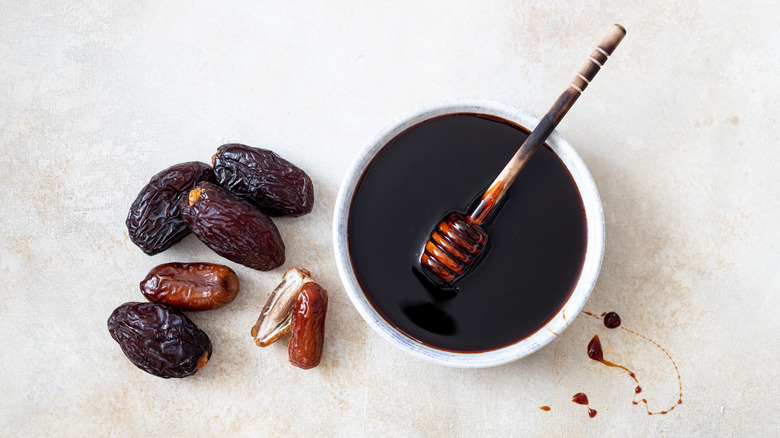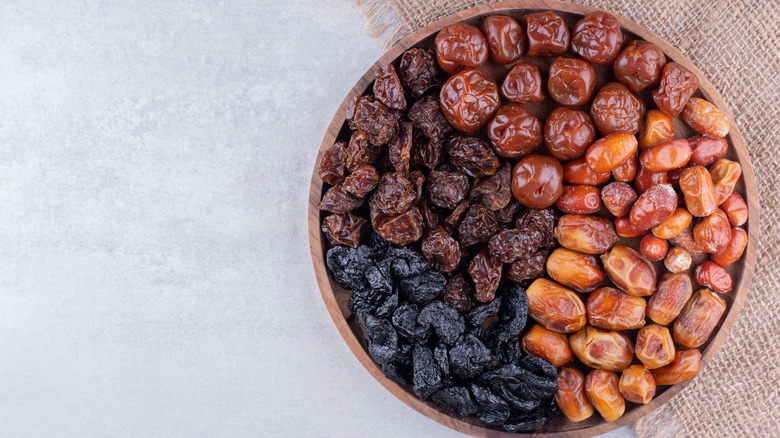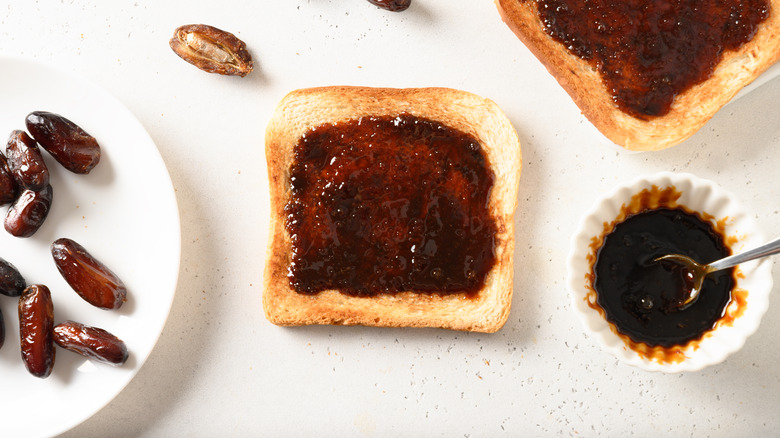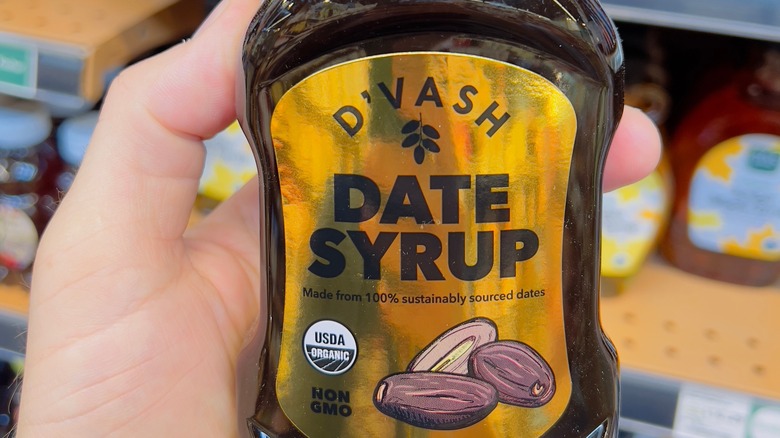Why Date Syrup Should Be Your Go-To Alternative Sweetener
In the modern-day world of alternative sweeteners, the baking aisles are filled with enough sugar substitutes to your heart's content. Honey, maple syrup, stevia, agave, and monk fruit sweetener are just a few of the options out there, but not all are made equally. While sugar's contribution to obesity, type 2 diabetes, and heart disease has led the U.S. Centers for Disease Control and Prevention (CDC) to advise Americans to limit their intake of it, some alternative sweeteners have also proven to have their share of long-term health effects.
According to Food Navigator, not only has the World Health Organization found that synthetic and alternative sweeteners don't contribute any long-term benefits, but their long-term use is also related to an increased risk of the same chronic diseases of traditional sugar. This is primarily due to their everyday use in highly processed foods, as opposed to the whole, nutrient-dense ones. But that's where date syrup, a single-ingredient, honey-like nectar extracted from dates, stands apart.
Sweet and low on the glycemic index, all while maintaining many of the rich benefits dates are known for (per Woodspur Farms), date syrup is the alternative sweetener that gives you the best of both worlds.
How it's made
As you can probably guess, making date syrup requires one ingredient above all else: Dates. That's because they're really the only ingredient you need aside from water. As Sylvie Charles, founder of Just Date, explains to Bon Appétit, the process starts by pitting and chopping Medjool dates, soaking, and simmering them in water, and then pressing and straining them until you achieve a dark, silky syrup.
The result is a thick, almost caramel-like syrup that is slightly darker in color — closer to the shade of molasses but without the goopy texture. The consistency actually lies somewhere between honey and maple syrup (per One Green Planet), but the taste is on a level all its own. Date syrup has the same caramelly goodness you experience while eating a date, with warm notes of vanilla and molasses.
While it may not be quite as sweet as honey or maple syrup, according to Alpha Foodie, date syrup's subtle tangy-raisin finish makes anything it's drizzled into unique with very little processing, and even fewer ingredients, involved.
How to use date syrup
What date syrup lacks in ingredients, it makes up for in its uses — which are seemingly infinite. Martha Stewart lists as many as 13, from sweets like overnight oats or ice cream to other more savory bites. It can serve either as an egg-wash substitute on your homemade bread or mixed into olive oil and used to create a salad vinaigrette or a glaze to go over salmon or roasted vegetables.
While date syrup can be substituted for honey, molasses, agave, or sugar in recipes using a 1:1 ratio, Date Lady points out that it can add a bit of moisture to your recipes. So, depending on the desired texture of whatever you're making, it might not hurt to add an extra bit of your dry ingredients to counter that moisture. However, if you're making a recipe such as cookies or poundcake that doesn't call for much liquid, you should opt for date sugar instead.
Nutrition and benefits
What date syrup makes up for in its long list of uses, it also has two-fold in its nutritional benefits. As Healthline outlines, dates are nutritious and antioxidant-rich, with disease-fighting and brain-boosting benefits. Fortunately, a lot of those benefits are maintained in the date syrup process as well, particularly the heart-healthy ones (per Woodspur Farms). But date syrup doesn't just lack sodium, cholesterol, trans fat, and saturated fat; it's also exceptionally high in potassium and magnesium — two minerals that contribute to heart health. In fact, date syrup contains more than twice the potassium and magnesium levels that maple syrup or honey do (via Bon Appétit).
According to One Green Planet, date syrup also contains more iron and calcium than its contenders, which are both minerals that support the growth and development of your body (via the National Institute of Health). But what's really special about date syrup is its glycemic index. As Woodspur Farms explains, all sweeteners contain various levels of fructose, glucose, or sucrose. While too much glucose causes your blood sugar to spike, too much fructose can stress your liver. Date syrup, however, contains an equal amount of each, so your blood sugar doesn't spike, and your liver can relax. As a result, date syrup measures out to a glycemic index of 47 compared to sugar's 70, according to Bon Appétit.
Where to buy date syrup
As long as you have some dates on hand, date syrup is simple to make in the comfort of your own home. Plus, it's a great way to get your use out of them before your dates have gone bad. However, if you're not ready to commit quite yet or you simply don't have the time, date syrup can be purchased online and in-store much more commonly than you may think. Even Trader Joe's carries some options.
When you are on the hunt for date syrup, your best bet is the baking aisle. That's where you'll find it at most stores, usually set neatly along the shelves of maple syrup and honey. However, a quick Google search of "date syrup" brings up thousands of options, from brands like Date Lady and Just Date to ones like ZIYAD or Baraka from the Middle East, where date syrup has been used for more than six thousand years (via One Green Planet).




